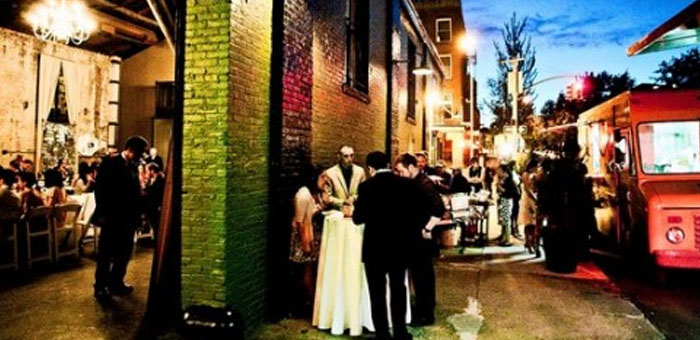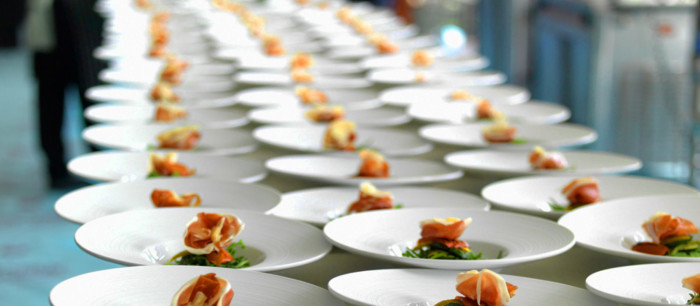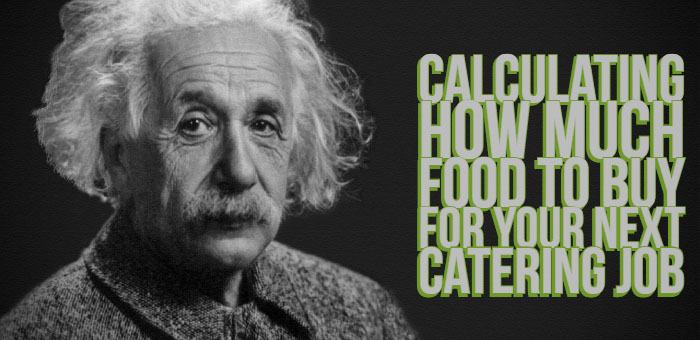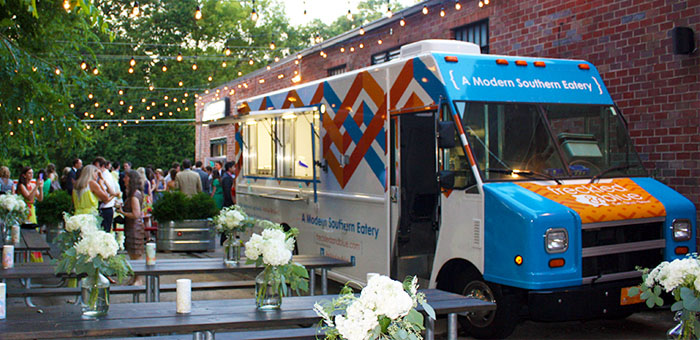With catering becoming a common value added service that food truck owners are providing, it is important to make sure you have a legal document in place to protect yourself and your clients. A catering proposal is the quote given to the client that outlines the services, food and beverages that will be provided for an event as well as the cost of each service and menu item.
The catering proposal usually also doubles as a contract: if the client is happy with it and wants to contract you as their caterer, they will sign it at the bottom and give their payment information.
In order to create a catering proposal, you will have to outline everything you will provide to your client with a price attached to each piece, as well as a grand total price quote for the entire event. There is no specific order that you have to use to present your catering proposal. However, it is recommended that you use a certain organization to make your catering proposal less confusing.
Food Truck Catering Proposal And Quote
Cover Letter & General Information
This section introduces your proposal and sets down the basics so that you and your client can better understand the costs that the event will incur. While you should not include any of the pricing on this page, getting the basics out of the way now will allow you to explain additional fees or costs incurred due to date, location and other factors. Your cover letter should include all of the following general information for the event:
- Type of event. Whether it is a fancy event or a casual one will influence the kind of services you provide and the costs of catering. A wedding with a full-service buffet will usually cost more than a casual picnic with only food drop-off service.
- Date of the event. This will actually have an impact on the final cost. For example, because demand for catering services varies from season to season, an event that takes place near the holidays will likely have a higher cost than events that take place during other parts of the year.
- Time of the event. An event that requires the caterer’s time for three hours will be more expensive than one that requires only two hours of the caterer’s time.
- Venue location. If the venue is farther away, you may have to add additional fees for delivery and gas costs.
- Minimum guaranteed guest count. It is standard to request that your client give you a guaranteed guest count. The pricing is based on that guest count. That way, you will not over-prepare for the event and lose money if fewer guests show up. You should still bring 10% extra just in case guests consume more than expected or more guests show up. If you serve more people than the guaranteed guest count, you can still charge for each additional guest.
Menu and Menu Pricing
The next item on your catering proposal should be the event menu. When pricing the food and drinks, you will want to include the following information:
- List of menu items
- Cost per person or per platter for each item
- Total cost for each item
- Total costs for the whole menu
You should also include the price of the added costs incurred for the food, such as chafing dish rental, cost of disposable utensils and dinnerware, cake cutting costs, etc. Make sure to explain each food-related fee, or it will look like you are overcharging.
Additional Fees
In catering proposals, there are often additional fees not related to the food. Try to charge for as few added fees as possible, even if it means increasing your menu pricing. For the fees you do charge, you must charge a fair price and offer a full explanation of each service and why it is needed, either on the proposal or directly to your client. One of the biggest mistakes you can make is to have it look like you are charging for nothing. In fact, many caterers only use custom quoting. That way they have the option of simply adding the fee to their menu pricing so it looks like there are no suspicious fees.
Generally, additional fees can include any or all of the following:
- Labor costs. Make it very clear exactly what you are charging for. List the number of staff needed for each task, such as servers, bartenders (if your catering license allows), and on-site chefs. If your staff works longer than expected, you should already have a clear formula to determine the additional charge. Use the following equation to determine your labor costs:
|
Duration of the Event (in hours) x # of Staff Needed x Hourly Wage |
- For example, if you need 4 staff to service a 3-hour event, and you pay them $11.50 per hour, your labor costs would be 3 x 4 x 11.50, or $138.
- Delivery fee. Some caterers include a delivery fee that is standard on all of their contracts. As an alternative to a standard fee, you may only want to charge extra for delivery if your client wants you to cater an event that is far away.
- Operations charge. Some caterers charge an operating charge for every client, either as a replacement for other charges or in addition. This is usually used to cover the overhead, equipment costs, preparation costs and other additional costs incurred. Be sure to fully explain this fee to your client.
- Event planning fees. If you helped your client plan the event or spent extra time to assist them in contracting with florists, photographers and DJs, you may want to charge an additional fee to cover the time and effort you spent planning the event.
The Final Quote
When you are done creating each part of your catering proposal, add all of the charges up to determine the final quote. On the final page, list the total charge for each part of your proposal, then add them all up to determine the grand total. That way, the client can clearly see exactly what they are paying for each part of the catering contract.
It is imperative that you assess the final quote to ensure that you are making money on the event. For a catering business, after all expenses for an event are subtracted, typical profits from an event can be as much as 30% of revenue for large events and up to 50% for small functions. After overhead and other costs are subtracted, you can expect to make 20%-30% profit margin.
Catering Policies and Contract
This section of the proposal lists the caterer’s policies and covers all of the following:
- Guaranteed Minimum Guest Count. If fewer guests show up than are guaranteed, the caterer still gets paid according to this guaranteed guest count. If more guests show up, you should reserve the right to charge a fair price for the additional services, labor, food and drinks required.
- Guaranteed Time Duration. This is the client’s estimated time during which the caterer’s food and services will be needed. If the caterer’s services are needed for less time, the caterer still receives payment based on the guaranteed time duration. If your services are needed for a longer duration than expected, you should reserve the right to charge more for additional labor and services.
- Deposit. It is standard to charge a 50% deposit upon the signing of the contract, when the caterer’s service is booked or contracted.
- Cancellation Policies. Be sure to list the policies on cancellation and refund of the deposit. It is standard to refund the entire deposit if the client cancels within a month before the event, 50% of the deposit if the client cancels within 11 to 30 days before the event, and none of the deposit if the caterer is notified of cancellation less than 10 days before the event.
- Terms. Be sure to spell out the terms for payment of the final costs after the deposit. Typically, caterers request this payment on or before the 5th business day after the event. However, to be fair to the client, you may want to give them more leeway, such as 20 business days, to pay for any additional costs due to extra guests or unexpected labor or services required.
- Booking and payment. At the bottom of the final page, include an area where clients can fill in their payment information and sign to contract the caterer. This will serve as a binding legal contract for your services.
The Bottom Line
Adding catering to your food truck business isn’t easy, but it can be very rewarding as well as profitable. Share your tips on putting together a food truck catering proposal via email or on social media. Facebook | Twitter




